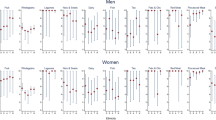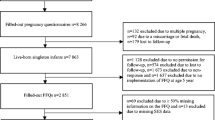Abstract
Mexican American adolescents have an increased risk for obesity compared to non-Hispanic whites (NHWs), especially as their degree of acculturation increases. Snack intakes can impact diet quality and may affect obesity risk, yet little is known about differences in snack intakes among NHW and Mexican American adolescents from different acculturation groups. This study compared diet quality and snack intakes among NHW and Mexican American adolescents from different acculturation groups. This study used cross-sectional data from 3636 Mexican American and NHW adolescents in the 2005–2014 National Health and Nutrition Examination Survey. Acculturation was defined based on generational status and language use. Outcomes were Healthy Eating Index-2015 (HEI-2015) score, daily energy intake from snacks, snack frequency, energy value of snacks, and percent contribution of snacks to total daily energy. Analysis of covariance was used to compare outcomes across groups, after adjustment for sex and income. In the full sample, mean HEI-2015 score was 45 ± 0.4. Non-Hispanic white adolescents had modestly poorer diet quality compared to US-born adolescents with a foreign-born parent and Mexican-born adolescents (P < 0.001). Mean daily snack intake was 583 ± 16 kcal. Items in the Snacks and Sweets and Beverages categories contributed more than half of the energy provided by snacks. Non-Hispanic white adolescents had a greater total snack intake compared to all language use at home groups, except equal Spanish and English use. Improving the types of foods consumed as snacks has the potential to partially mitigate differences in snack intakes and diet quality among non-Hispanic white and Mexican American adolescents.

Similar content being viewed by others
References
Ogden CL, Carroll MD, Lawman HG, Fryar CD, Kruszon-Moran D, Kit BK, et al. Trends in obesity prevalence among children and adolescents in the United States, 1988-1994 through 2013-2014. JAMA. 2016;315(21):2292–9.
Larson N, Story M. A review of snacking patterns among children and adolescents: what are the implications of snacking for weight status? Child Obes. 2013;9(2):104–15.
Larson NI, Miller JM, Watts AW, Story MT, et al. Adolescent snacking behaviors are associated with dietary intake and weight status. J Nutr. 2016;146(7):1348–55.
Piernas C, Popkin BM. Trends in snacking among U.S. children. Health Aff (Millwood). 2010;29(3):398–404.
Dunford EK, Popkin BM. 37 year snacking trends for US children 1977-2014. Pediatr Obes. 2018;13(4):247–55.
Hill SE, Bell C, Bowie JV, Kelley E, Furr-Holden D, LaVeist T, et al. Differences in obesity among men of diverse racial and ethnic background. Am J Mens Health. 2017;11(4):984–9.
Bhupathiraju SN, Hu FB. Epidemiology of obesity and diabetes and their cardiovascular complications. Circ Res. 2016;118(11):1723–35.
Ogden CL, Flegal KM, Carroll MD, Johnson CL. Prevalence and trends in overweight among US children and adolescents, 1999-2000. JAMA. 2002;288(14):1728–32.
Bleich SN, Wolfson JA. Trends in SSBs and snack consumption among children by age, body weight, and race/ethnicity. Obesity (Silver Spring). 2015;23(5):1039–46.
Liu JH, Chu YH, Frongillo EA, Probst JC. Generation and acculturation status are associated with dietary intake and body weight in Mexican American adolescents. J Nutr. 2012;142(2):298–305.
Gibson M. Immigrant adaptation and patterns of acculturation. Hum Dev. 2001;44:19–23.
Berry J. Contexts of acculturation. In: Sam DB, Berry JW, editors. Cambridge handbook of acculturation psychology. New York: Cambridge University Press; 2006. p. 27–42.
Alidu L, Grunfeld EA. A systematic review of acculturation, obesity and health behaviours among migrants to high-income countries. Psychol Health. 2018;33(6):724–45.
McLeod DL, Buscemi J, Bohnert AM. Becoming American, becoming obese? A systematic review of acculturation and weight among Latino youth. Obes Rev. 2016;17(11):1040–9.
Delavari M, Sonderlund AL, Swinburn B, Mellor D, et al. Acculturation and obesity among migrant populations in high income countries—a systematic review. BMC Public Health. 2013;13:458.
Ayala GX, Baquero B, Klinger S. A systematic review of the relationship between acculturation and diet among Latinos in the United States: implications for future research. J Am Diet Assoc. 2008;108(8):1330–44.
Pew Research Center. More Mexicans leaving than coming to the US. [cited 2018 October 1]; Available from: http://www.pewhispanic.org/2015/11/19/more-mexicans-leaving-than-coming-to-the-u-s/.
Albrecht SS, Gordon-Larsen P. Ethnic differences in body mass index trajectories from adolescence to adulthood: a focus on Hispanic and Asian subgroups in the United States. PLoS One. 2013;8(9):e72983.
Maldonado LE, Albrecht SS. Does the immigrant advantage in overweight/obesity persist over time in Mexican American youth? NHANES 1988-1994 to 2005-2014. Obesity (Silver Spring). 2018;26(6):1057–62.
Yoshida Y, Scribner R, Chen L, Broyles S, et al. Role of age and acculturation in diet quality among Mexican Americans—findings from the National Health and Nutrition Examination Survey, 1999-2012. Prev Chronic Dis. 2017;14:E59.
Reininger B, Lee M, Jennings R, Evans A, Vidoni M. Healthy eating patterns associated with acculturation, sex and BMI among Mexican Americans. Public Health Nutr. 2017;20(7):1267–78.
Eldeirawi K, Koenig MD, Persky V, Chavez N. Nativity and serum concentrations of antioxidants in Mexican American children: a cross-sectional study. Nutrients. 2014;6(4):1598–607.
Loren DM, Bohnert A, Santiago CD. Measures of acculturation and relations to zBMI among Mexican-origin youth. J Racial Ethn Health Disparities. 2019;6(2):364–70.
Centers for Disease Control and Prevention and National Center for Health Statistics (NCHS). National Health and Nutrition Examination Survey Data. 2019; Available from: https://www.cdc.gov/nchs/nhanes/index.htm.
Centers for Disease Control and Prevention. National Health and Nutrition Examination Survey, MEC in-person dietary interviewer’s procedure manual. 2009; Available from: https://www.cdc.gov/nchs/data/nhanes/nhanes_09_10/MECInterviewers.pdf.
Moshfegh AJ, Rhodes DG, Baer DJ, Murayi T, Clemens JC, Rumpler WV, et al. The US Department of Agriculture Automated Multiple-Pass Method reduces bias in the collection of energy intakes. Am J Clin Nutr. 2008;88(2):324–32.
U.S. Department of Agriculture Food and Nutrition Service. USDA Food and Nutrient Database for Dietary Studies. Food Surveys Research Group Home Page. 2018 [cited 2018; Available from: https://www.fns.usda.gov/cacfp/meals-and-snacks.
Krebs-Smith SM, Pannucci TE, Subar AF, Kirkpatrick SI, Lerman JL, Tooze JA, et al. Update of the healthy eating index: HEI-2015. J Acad Nutr Diet. 2018;118(9):1591–602.
DeSalvo KB, Olson R, Casavale KO. Dietary guidelines for Americans. JAMA. 2016;315(5):457–8.
Shriver LH, Marriage BJ, Bloch TD, Spees CK, et al. Contribution of snacks to dietary intakes of young children in the United States. Matern Child Nutr. 2018;14(1):e12454.
IBM Corp. IBM SPSS Statistics for Windows. Released 2012, IBM Corp: Armonk, NY.
Larson N, Story M, Eisenberg ME, Neumark-Sztainer D. Secular trends in meal and snack patterns among adolescents from 1999 to 2010. J Acad Nutr Diet. 2016;116(2):240–50 e2.
Montez JK, Eschbach K. Country of birth and language are uniquely associated with intakes of fat, fiber, and fruits and vegetables among Mexican-American women in the United States. J Am Diet Assoc. 2008;108(3):473–80.
Batis C, Hernandez-Barrera L, Barquera S, Rivera JA, Popkin BM. Food acculturation drives dietary differences among Mexicans, Mexican Americans, and non-Hispanic whites. J Nutr. 2011;141(10):1898–906.
Frisco ML, Quiros S, Van Hook J. One size may not fit all: how obesity among Mexican-origin youth varies by generation, gender, and age. Demography. 2016;53(6):2031–43.
Piernas C, Popkin BM. Increased portion sizes from energy-dense foods affect total energy intake at eating occasions in US children and adolescents: patterns and trends by age group and sociodemographic characteristics, 1977-2006. Am J Clin Nutr. 2011;94(5):1324–32.
Livingstone MB, Pourshahidi LK. Portion size and obesity. Adv Nutr. 2014;5(6):829–34.
Duffey KJ, Rivera JA, Popkin BM. Snacking is prevalent in Mexico. J Nutr. 2014;144(11):1843–9.
Wang D, van der Horst K, Jacquier EF, Afeiche MC, et al. Snacking patterns in children: a comparison between Australia, China, Mexico, and the US. Nutrients 2018;10(2):198.
Fox M, Thayer Z, Wadhwa PD. Assessment of acculturation in minority health research. Soc Sci Med. 2017;176:123–32.
Schwartz SJ, Unger JB, Zamboanga BL, Szapocznik J. Rethinking the concept of acculturation: implications for theory and research. Am Psychol. 2010;65(4):237–51.
Centers for Disease Control and Prevention. Competitive foods and beverages available for purchase in secondary schools--selected sites, United States, 2006. MMWR Morb Mortal Wkly Rep. 2008;57(34):935–8.
Borradaile KE, Sherman S, Vander Veur SS, McCoy T, Sandoval B, Nachmani J, et al. Snacking in children: the role of urban corner stores. Pediatrics. 2009;124(5):1293–8.
Martin MA, Van Hook JL, Quiros S. Is socioeconomic incorporation associated with a healthier diet? Dietary patterns among Mexican-origin children in the United States. Soc Sci Med. 2015;147:20–9.
Himmelgreen DA, Cantor A, Arias S, Romero DN. Using a biocultural approach to examine migration/globalization, diet quality, and energy balance. Physiol Behav. 2014;134:76–85.
Zhang D, van Meijgaard J, Shi L, Cole B, Fielding J. Does neighbourhood composition modify the association between acculturation and unhealthy dietary behaviours? J Epidemiol Community Health. 2015;69(8):724–31.
Ramirez AS, Golash-Boza T, Unger JB, Baezconde-Garbanati L. Questioning the dietary acculturation paradox: a mixed-methods study of the relationship between food and ethnic identity in a group of Mexican-American women. J Acad Nutr Diet. 2018;118(3):431–9.
Berry JW, Phinney JS, Sam DL, Vedder P. Immigrant youth: acculturation, identity, and adaptation. Appl Psychol. 2006;55(3):303–32.
Swinburn B, Egger G, Raza F. Dissecting obesogenic environments: the development and application of a framework for identifying and prioritizing environmental interventions for obesity. Prev Med. 1999;29(6 Pt 1):563–70.
Langellier BA, Brookmeyer R, Wang MC, Glik D. Language use affects food behaviours and food values among Mexican-origin adults in the USA. Public Health Nutr. 2015;18(2):264–74.
Ayala GX, Baquero B, Arredondo EM, Campbell N, Larios S, Elder JP. Association between family variables and Mexican American children’s dietary behaviors. J Nutr Educ Behav. 2007;39(2):62–9.
Corvalan C, Garmendia ML, Jones-Smith J, Lutter CK, et al. Nutrition status of children in Latin America. Obes Rev. 2017;18(Suppl 2):7–18.
Popkin BM, Reardon T. Obesity and the food system transformation in Latin America. Obes Rev. 2018;19(8):1028–64.
Mendoza A, Perez AE, Aggarwal A, Drewnowski A. Energy density of foods and diets in Mexico and their monetary cost by socioeconomic strata: analyses of ENSANUT data 2012. J Epidemiol Community Health. 2017;71(7):713–21.
Perez-Escamilla R, Putnik P. The role of acculturation in nutrition, lifestyle, and incidence of type 2 diabetes among Latinos. J Nutr. 2007;137(4):860–70.
Beaton GH, Burema J, Ritenbaugh C. Errors in the interpretation of dietary assessments. Am J Clin Nutr. 1997;65(4 Suppl):1100S–7S.
Poslusna K, Ruprich J, de Vries JH, Jakubikova M, et al. Misreporting of energy and micronutrient intake estimated by food records and 24 hour recalls, control and adjustment methods in practice. Br J Nutr. 2009;101(Suppl 2):S73–85.
Ahluwalia N, Dwyer J, Terry A, Moshfegh A, Johnson C. Update on NHANES dietary data: focus on collection, release, analytical considerations, and uses to inform public policy. Adv Nutr. 2016;7(1):121–34.
Popkin BM, Udry JR. Adolescent obesity increases significantly in second and third generation U.S. immigrants: the National Longitudinal Study of Adolescent Health. J Nutr. 1998;128(4):701–6.
Tripicchio GL, Kachurak A, Davey A, Bailey RL, et al. Associations between snacking and weight status among adolescents 12–19 years in the United States. Nutrients 2019;11(7):1486.
Funding
The first author received salary support from the National Institutes of Health (NIH T32 DK007658).
Author information
Authors and Affiliations
Contributions
TB, SJ, and CT conceptualized the project, TB and CT analyzed the data, TB drafted the manuscript, SJ and CT provided substantive feedback on the manuscript. TB, SJ, CT reviewed the final manuscript.
Corresponding author
Ethics declarations
Conflict of Interest
Dr. Bekelman, Dr. Johnson, and Dr. Taylor declare that they have no conflict of interest.
Research Involving Human Participants
All procedures performed in studies involving human participants were in accordance with the ethical standards of the institution and/or national research committee (The National Center for Health Statistics’ Research Ethics Review Board, #2018-01) and with the 1964 Helsinki declaration and its later amendments or comparable ethical standards.
Informed Consent
Informed consent was obtained from all individual participants included in the study.
Additional information
Publisher’s Note
Springer Nature remains neutral with regard to jurisdictional claims in published maps and institutional affiliations.
Rights and permissions
About this article
Cite this article
Bekelman, T.A., Johnson, S.L. & Taylor, C.A. Differences in Diet Quality and Snack Intakes Among Non-Hispanic White and Mexican American Adolescents from Different Acculturation Groups. J. Racial and Ethnic Health Disparities 7, 1090–1099 (2020). https://doi.org/10.1007/s40615-020-00732-8
Received:
Revised:
Accepted:
Published:
Issue Date:
DOI: https://doi.org/10.1007/s40615-020-00732-8




